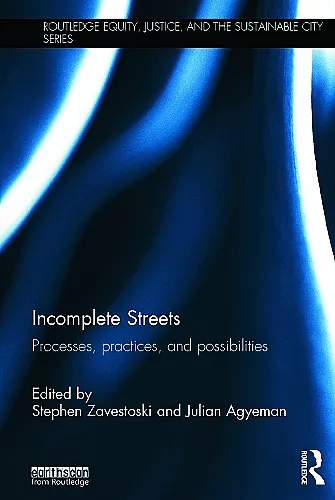Incomplete Streets
Processes, practices, and possibilities
Julian Agyeman editor Stephen Zavestoski editor
Format:Hardback
Publisher:Taylor & Francis Ltd
Published:27th Aug '14
Currently unavailable, and unfortunately no date known when it will be back
This hardback is available in another edition too:
- Paperback£53.09was £58.99(9780415725873)

The ‘Complete Streets' concept and movement in urban planning and policy has been hailed by many as a revolution that aims to challenge the auto-normative paradigm by reversing the broader effects of an urban form shaped by the logic of keeping automobiles moving. By enabling safe access for all users, Complete Streets promise to make cities more walkable and livable and at the same time more sustainable.
This book problematizes the Complete Streets concept by suggesting that streets should not be thought of as merely physical spaces, but as symbolic and social spaces. When important social and symbolic narratives are missing from the discourse and practice of Complete Streets, what actually results are incomplete streets. The volume questions whether the ways in which complete streets narratives, policies, plans and efforts are envisioned and implemented might be systematically reproducing many of the urban spatial and social inequalities and injustices that have characterized cities for the last century or more. From critiques of a "mobility bias" rooted in the neoliberal foundations of the Complete Streets concept, to concerns about resulting environmental gentrification, the chapters in Incomplete Streets variously call for planning processes that give voice to the historically marginalized and, more broadly, that approach streets as dynamic, fluid and public social places.
This interdisciplinary book is aimed at students, researchers and professionals in the fields of urban geography, environmental studies, urban planning and policy, transportation planning, and urban sociology.
"The "Complete Streets" approach seems to be a feasible way to improve access, health, and economic activity. But are we really challenging inequality and inequity by designing and building "Complete Streets"? This edited volume is thought provoking, and a good way to start the conversation about this urgent question." –Lois M. Takahashi, University of California, Los Angeles, USA
"Incomplete Streets asks important questions about how equitable Complete Streets really are. While seemingly benign, authors in this well-edited collection, argue that this vision of street design ignores key street users from sidewalk venders to low-wage auto commuters. This is a timely critique that deserves attention."–Ann Forsyth, Harvard University, USA
"Over the last 30 years our urban spaces have become increasingly neo-liberalised commodities and privatised public places. This timely collection reveals the contested space tensions and the successes that can be achieved in local streets. The Complete Streets movement will challenge attitudes of highways and engineering professionals, and those of urban planners too. We should refocus our attention to ‘people and places’ rather than ‘land users’ to become truly equitable and sustainable; afterall it is people that make places." –Mark Tewdwr-Jones, Newcastle University, UK
"This important book takes a hard look at the emerging movement for livability and asks the essential question: For whom? The authors' unflinching, good humoured perspectives are essential reading for anyone who cares about the shape of our cities." –Elly Blue, Bikenomics Industrial Complex.
"This volume offers an important critique of how potentially progressive ideas such as Complete Streets can be misunderstood or co-opted to maintain and exacerbate an unequal urban status quo." – Rike Sitas, African Centre for Cities
ISBN: 9780415725866
Dimensions: unknown
Weight: 740g
346 pages